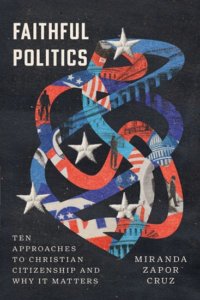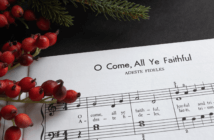As we navigate our opinions on public policy and electoral choices, it’s tempting to delegate our critical thinking to others. Miranda Zapor Cruz writes that Kingdom citizens must resist this ease and strive to stay engaged, informed, and even conflicted. By doing so, we uphold our responsibilities as faithful citizens, ensuring our actions reflect thoughtful and conscientious participation.
As we develop and reconsider our opinions about public policy and decide which candidates to vote for in local, state, and national elections, we will be tempted to outsource our critical thinking to politicians, family, online influencers, or pastors. We should resist that easy release from political tension, and instead make the effort to be engaged, informed, and conflicted.
Engaged
“Decisions are made by those who show up,” said The West Wing’s fictional president Josiah Bartlet (Aaron Sorkin, “What Kind of Day Has It Been?,” The West Wing, season 1, episode 22). It is a maxim worth remembering in a country where we have the right to vote, to petition the government, to speak in public forums regarding legislation, and even to protest. It can be easy to become cynical about the government. And yet, showing up is an act of faithful citizenship. We need to love our neighbors enough to pay attention to what is happening in our communities, the country, and around the world, and to be faithfully engaged for the sake of the common good and Christian witness.
Engagement means more than watching cable news, listening to talk radio, and absorbing the views of our favorite political entertainers. In fact, these behaviors are more likely to make us bland. A first step to engagement can be to follow the proceedings of your state legislature. Pay attention to local newspapers, radio stations, or television shows that report on local government in a nonpartisan way. As we learn more about local and national policy issues, we may discover a passion for a few key issues that inspire us to show up. We can contact our representatives, participate in town hall meetings, attend public demonstrations, join local advocacy groups, or even run for office. Not everyone has the time and resources to show up in the same ways, but we all have some capacity to engage with the government.
Informed
Kingdom citizens should make an effort to be well informed and should also have the humility to admit when we lack information. Certainty about our opinions should be proportional to how informed we are about an issue, policy, or candidate. Ironically, more information will often lead to less political certainty. We should seek out the most accurate information available and intentionally counteract confirmation bias.
Several years ago, I agreed to participate in a research study about the impact of news sources on political opinions. Participants in the study were asked to follow several news organizations with different partisan leanings, such as the center-right Wall Street Journal and the center-left New York Times. It was fascinating to see how different news organizations covered different issues and to read erudite editorials written through different polity lenses. I continue to follow a wide range of news sources, being aware of their pollical and ideological tendencies so I can seek a balanced information diet. The “Media Bias Chart,” though not perfect, is a good place to start to identify the partisan leadings of news sources and to cultivate a healthy field of fact-based information. Christians should avoid sources that do not subscribe to standards of journalistic ethics or that use incendiary or dehumanizing rhetoric to fire up their audience. Anger and fear are not fruit of the Spirit, so information sources that intentionally foster anger and fear are not trustworthy guides for Kingdom citizens.
Conflicted
Kingdom citizens should be conflicted about our policy opinions and partisan leadings. Most policy decisions benefit some people and cost others. We should not delude ourselves into thinking that making the “right” policy decision will only have positive consequences, even when we believe the costs are justified. For that reason, Kingdom citizens should not be single-issue voters. It is easy to choose one or two topics, form a settled opinion about them, and then allow those opinions to steer all other political behavior. When we feel very strongly about an issue, it can be difficult to take opposing viewpoints seriously or listen when people tell us a policy we support is causing harm. Love of neighbor compels us to good faith consideration of opposing perspectives. Even if our position does not change, we should feel conflicted about real or potential harm and address the consequences of policies we endorse. Being conflicted does not mean never making up our minds or being neutral, but it can mean writing our positions in pencil instead of blood and being prepared to change our minds. When we refused to be conflicted, settling instead for a false simplicity, we are included to become bland partisans.
 Taken from Faithful Politics by Miranda Zapor Cruz. Copyright (c) 2024 by Miranda Zapor Cruz. Used by permission of InterVarsity Press, P.O. Box 1400, Downers Grove, IL 60515, USA. www.ivpress.com. The book is available at InterVarsity Press, Cokesbury, and Amazon .
Taken from Faithful Politics by Miranda Zapor Cruz. Copyright (c) 2024 by Miranda Zapor Cruz. Used by permission of InterVarsity Press, P.O. Box 1400, Downers Grove, IL 60515, USA. www.ivpress.com. The book is available at InterVarsity Press, Cokesbury, and Amazon .
Related Resources
- The Church and Election Day by Doug Powe and Ann Michel
- Leading Between Faith and Patriotism by Lovett Weems
- 5 Things to Consider Before Engaging a Public Issue by Ginger Gaines-Cirelli
- 4 Opportunities for the Church in the Current Political Tension by Carey Nieuwhof







